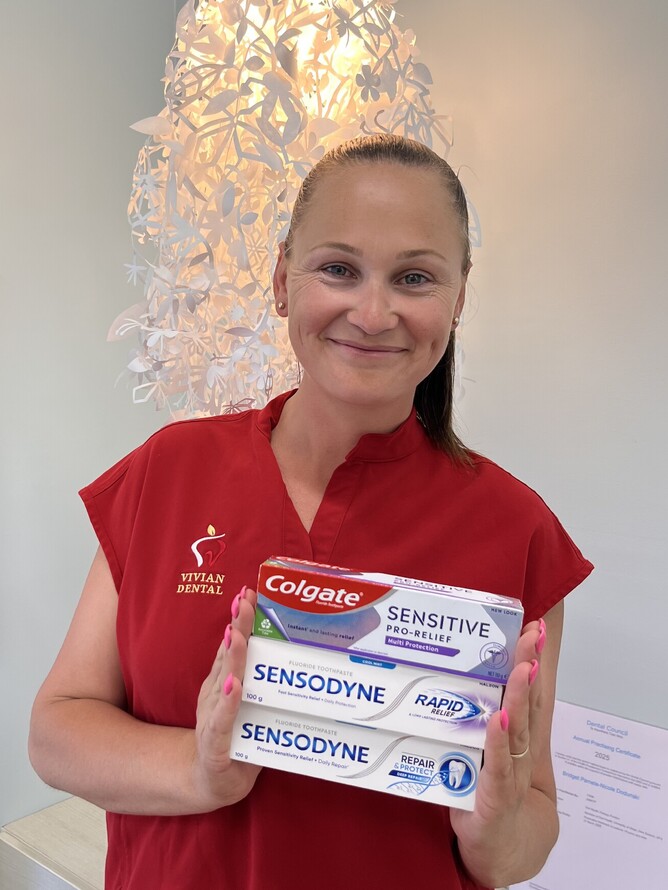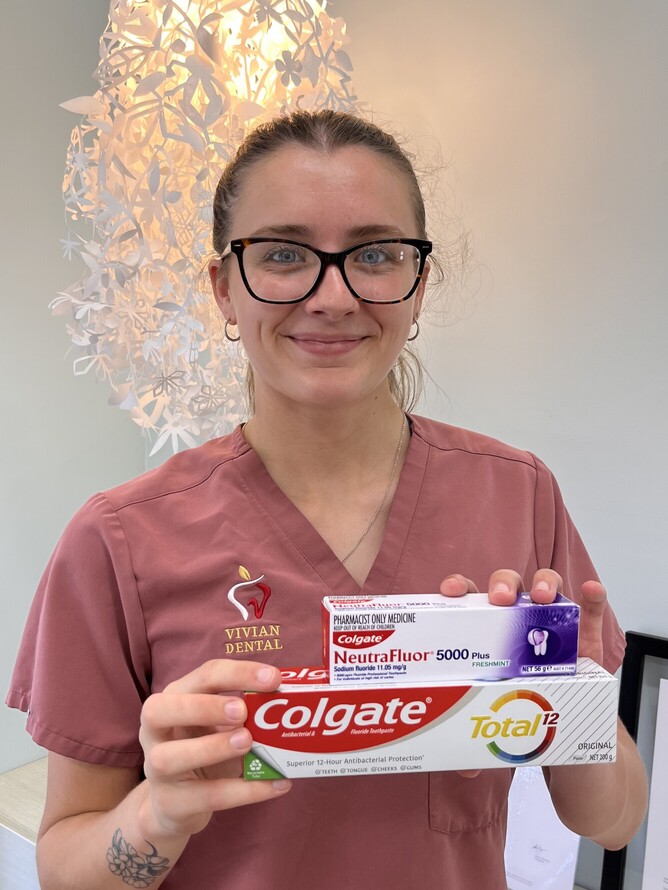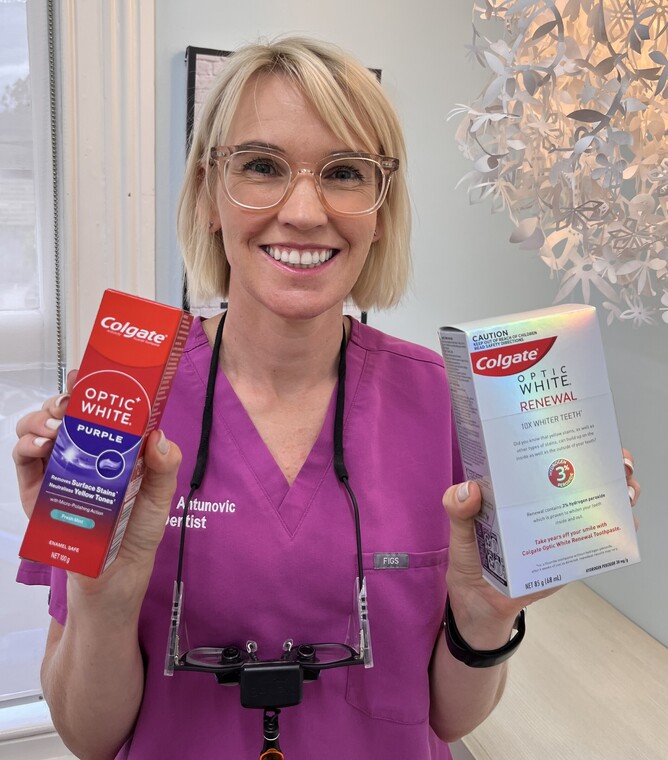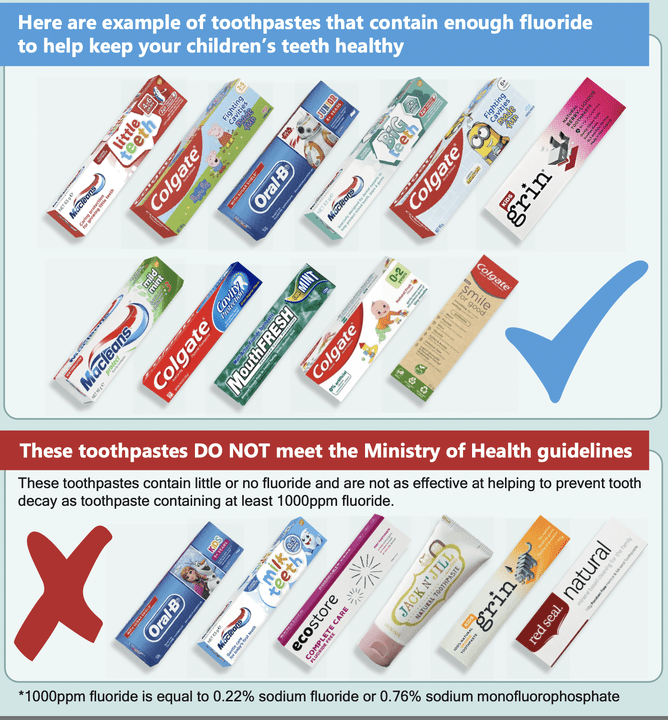Fluoride Toothpaste
Fluoride toothpaste is a type of toothpaste that contains fluoride, a naturally occurring mineral known for its ability to prevent tooth decay and strengthen tooth enamel. The main purpose of fluoride in toothpaste is to help remineralize enamel that has started to decay, making it more resistant to acid attacks from bacteria in the mouth.
When you brush your teeth with fluoride toothpaste, it helps to:
Prevent cavities – Fluoride can inhibit the growth of harmful bacteria and prevent plaque buildup.
Remineralize enamel – It helps restore minerals to areas of your enamel that have been weakened by acids, strengthening your teeth.
Reduce tooth sensitivity – Fluoride can also help reduce the pain or discomfort associated with sensitive teeth.
Most modern toothpastes contain fluoride, though there are non-fluoride options available for people who prefer them (but we don’t recommend this as you will be more prone to cavities). The level of fluoride in toothpaste is regulated to ensure it's effective for oral health without being harmful. Generally, it's recommended to use a pea-sized amount when brushing to avoid swallowing too much fluoride, especially for children.
Examples: Colgate total, Oral B
Sometimes the dentist will prescribe you even higher fluoride content toothpaste. Neutrafluor 5000 is a pharmacy only toothpaste. The dentist will prescribe this to you if you have high decay. Neutrafluor contains 5000ppm fluoride.
Sensitive toothpaste
Sensitive toothpaste is a type of toothpaste specifically formulated to help people who experience tooth sensitivity. Tooth sensitivity happens when the enamel on your teeth wears down or the gums recede, exposing the underlying dentin, which contains tiny nerve endings. These exposed areas can cause pain or discomfort when you consume hot, cold, sweet, or acidic foods and drinks.
Sensitive toothpaste works in a few key ways to reduce this discomfort:
Desensitizing agents – These toothpastes often contain ingredients like potassium nitrate or strontium chloride. These compounds help block the nerve signals in the exposed dentin, reducing the sensation of pain.
Strengthening enamel – Many sensitive toothpastes also contain fluoride or other ingredients that help to remineralize the enamel, which can reduce exposure to the dentin and make your teeth more resistant to sensitivity.
Gentle on teeth – These toothpastes are typically formulated to be less abrasive than regular toothpaste, helping prevent further enamel wear or gum irritation, which can worsen sensitivity.
Regular use of sensitive toothpaste can often provide relief, though it may take a few weeks for noticeable improvement. If sensitivity persists, it’s a good idea to visit a dentist to rule out any underlying issues like cavities or gum disease.
Examples: Colgate pro relief, Sensodyne rapid relief, Sensodyne repair and protect. Proenamel Proenamel doesn't contain desensitising agents but is good for people with tooth-wear as it is not very abrasive.
Note: Sensodyne repair and protect and Proenamel does not contain sodium laurel sulphate (SLS), which is something they put in toothpaste to make it ‘foam up’. Some people can be sensitive to this.
Whitening toothpastes
Whitening toothpastes: there are a lot on the market these days. We recommend the colgate optic white range. But be careful as these can cause sensitivity and can be more abrasive. They contain hydrogen peroxide and also are more abrasive to remove stains. Not recommended for people with sensitivity or tooth-wear. They also do have a purple toothpaste which neutralises yellow tones.
Examples: Colgate optic white: Optic white 1%, Optic white 2%, Optic white pro series 5%, Optic white purple
Nano-hydroxyapatite- NOTE there are no clinical trials that show the effectiveness of these yet. But they could be a good alternative if you are anti-fluoride.
Toothpaste with nano-hydroxyapatite (n-HAp) is a newer type of toothpaste designed to help with tooth remineralization and enamel repair. Hydroxyapatite is a naturally occurring mineral that makes up a significant portion of your tooth enamel and bones. Nano-hydroxyapatite refers to this substance being broken down into very tiny particles, or "nanoparticles," making it more effective at penetrating and repairing damaged enamel.
Here’s how it works:
Remineralization – When you use toothpaste with nano-hydroxyapatite, the tiny particles are able to fill in microscopic cracks and weakened areas in your enamel. These nanoparticles bond to your teeth, helping to restore minerals lost due to acid erosion or cavities, and ultimately strengthen your enamel.
Enamel repair – Nano-hydroxyapatite doesn’t just remineralize; it also actively helps to repair the surface of the enamel by smoothing it out and making it more resistant to future damage.
Sensitive teeth relief – Because nano-hydroxyapatite helps to rebuild and strengthen enamel, it can also reduce tooth sensitivity. The nanoparticles form a protective layer over exposed dentin (the layer beneath the enamel), which shields the nerves from pain caused by hot, cold, or acidic substances.
Safety and Biocompatibility – Nano-hydroxyapatite is biocompatible, meaning it’s safe for your body, and it’s often considered a more natural alternative to fluoride toothpaste. Some people prefer it because it doesn't contain fluoride, making it suitable for those who are looking for a fluoride-free option.
This type of toothpaste can be a good choice for people looking to improve enamel health, reduce sensitivity, or simply try a non-fluoride-based alternative that still provides excellent care for their teeth.
Product Examples: Grin Natural Strengthening toothpaste, Bliss energetics, MooGoo, Aotearoad Tooth Tablets Adults - Fresh Mint
Children and toothpaste
The Ministry of Health recommends everyone use a fluoride toothpaste that contains at least 1000 parts per million (ppm) fluoride* to help prevent tooth decay. Children can often use the same fluoride toothpaste as adults so long as they use the correct amount for their age. Use a half-pea sized amount of toothpaste for 0-6 year olds, or less if they only have a few teeth, for everyone else, a pea-sized amount is sufficient.



